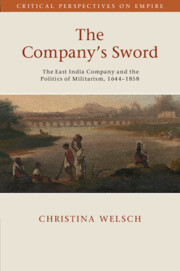Book contents
- The Company’s Sword
- Critical Perspectives on Empire
- The Company’s Sword
- Copyright page
- Contents
- Figures
- Maps
- Acknowledgments
- A Note on Spelling and Place Names
- Maps
- Introduction
- 1 Forging the Sword
- 2 The Sepoy’s Oath
- 3 Mercenaries, Diplomats, and Deserters
- 4 The Other Revolution of 1776
- 5 The Empire Preserved
- 6 Stratocracy
- 7 Breaking the Officers’ Sword
- Conclusion
- Bibliography
- Index
5 - The Empire Preserved
Published online by Cambridge University Press: 08 September 2022
- The Company’s Sword
- Critical Perspectives on Empire
- The Company’s Sword
- Copyright page
- Contents
- Figures
- Maps
- Acknowledgments
- A Note on Spelling and Place Names
- Maps
- Introduction
- 1 Forging the Sword
- 2 The Sepoy’s Oath
- 3 Mercenaries, Diplomats, and Deserters
- 4 The Other Revolution of 1776
- 5 The Empire Preserved
- 6 Stratocracy
- 7 Breaking the Officers’ Sword
- Conclusion
- Bibliography
- Index
Summary
In the 1770s, the rapid expansion of the Company’s territorial empire sparked social and political unease in Britain, fueling efforts to reform and to rein in the corporation. For many commentators, few reforms seemed more important than dissolving the Company’s independent army. For years, disagreements about the relative authority of Company and royal forces had complicated British military operations in India, and “consolidating” the two bodies into a unified British Army seemed the clear solution. This chapter explores how the Company’s white officers pushed back against this campaign, establishing a coherent political community in India and an influential lobbying group in Britain. In a flurry of petitions and pamphlets, officers maintained that “consolidation” was both unjust and imprudent: Royal officers would not know how to lead sepoys or to negotiate a war in India. When this written campaign failed to halt the planned reform, white officers across India staged a mutiny, which Company and Crown officials proved unable or unwilling to rebuff. Plans for consolidation were abandoned, while the officers’ collective influence over imperial policies was further solidified.
Keywords
- Type
- Chapter
- Information
- The Company's SwordThe East India Company and the Politics of Militarism, 1644–1858, pp. 142 - 170Publisher: Cambridge University PressPrint publication year: 2022

